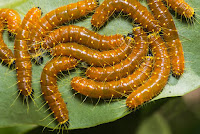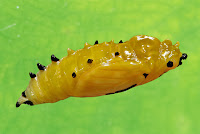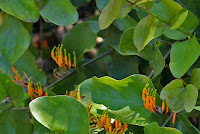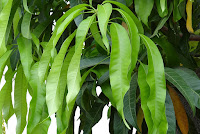<> Delias hyparete Linnaeus, 1758 <>
the Painted Jezebel ผีเสื้อหนอนกาฝากธรรมดา
Click on any photo to see all photos full size in Lightbox
Additions and corrections to the information provided on this page is always welcome. Please use the Contact form.
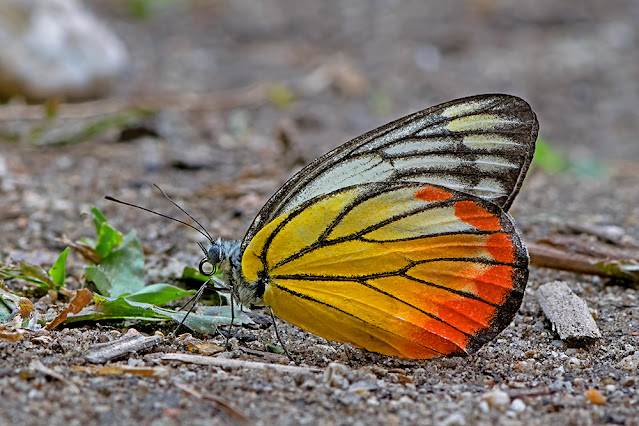
Photo taken at Doi Suthep-Pui National Park, Chiang Mai, Thailand 460m a.s.l.

Delias hyparete is quite common and is found in all countries across the South-East Asia region. They are easily recognized by the vibrant colouration of the hindwings on their ventral side. These colour patterns are aposematic, i.e. a warning signal to potential predators. The upper side of their wings is rather dull in comparison but that is the side that we rarely see as they usually bask with their wings closed. They are strong fliers and usually fly high up in the trees but come down to feed on nectar and to mud puddle.
This species can be seen all year round and is multivoltine with several broods per annum. The adult female lays her eggs in variable clusters of up to 70 eggs on the underside of a leaf on the host plant. The resulting larvae are gregarious and feed together on the younger leaves. They usually move away from the host plant to pupate.
Synonyms: Pieris luzonensis, Delias hierte, Thyca devaca
Taxonomy: Animalia - Arthropoda - Insecta - Lepidoptera - Papilionidae - Papilioninae - Delias - hyparete
Regional subspecies: D.h.hierta (S.China), D.h.hyparete (Indonesia), D.h.indica (Nepal, NE India, Myanmar, N.Thailand, Laos, Cambodia, Vietnam, S.China), D.h.luzonensis (Taiwan, Philippines), D.h.metarete (S.Myanmar, S.Thailand, W.Malaysia, Singapore).
Regional Distribution: India, Nepal, Bhutan, Bangladesh, Myanmar, Thailand, Laos, Cambodia, Vietnam, China, Taiwan, Malaysia, Singapore, Indonesia, Philippines
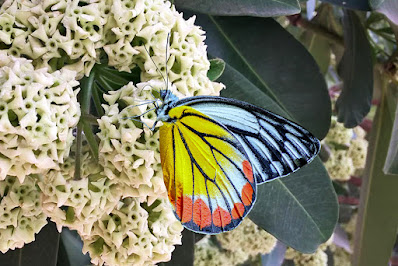 |
| Lamnamkok National Park, Chiang Rai, Thailand 450m a.s.l. |
Habitat: Delias hyparete is usually found in lowland habitats but has been recorded at moderate elevations up to around 1800m. Habitats include forests and forest edges plus urban parks and gardens.
Flight time: all year depending on location Wingspan: 65-80mm
Life History: egg 3-5 days instar 1 3 days instar 2 3-5 days instar 3 3-4 days instar 4 4 days instar 5 5-7 days pupa 7 days Total egg to adult 28-35 days. All times are approximate.
Larval Hosts: Dendrophthoe falcata, Dendrophthoe glabrescens, Dendrophthoe pentandra, Helixanthera cylindrica, Macrosolen cochinchinensis, Scurrula ferruginea, Taxillus limprichtii, Taxillus sutchuenensis (Loranthaceae), Annona muricata, Annona squamosa (Annonaceae), Averrhoa bilimbi (Oxalidaceae), Cocos nucifera (Arecaceae), Nephelium lappaceum (Sapindaceae), Dendrotrophe varians, Santalum album (Santalaceae), Theobroma cacao (Malvaceae), Mangifera indica (Anacardiaceae), Senna siamea (Fabaceae), Cestrum nocturnum (Solanaceae).
Actual host plant used depends upon location and availabilty of plant species.
Adult Food Sources: Nectar - Duranta erecta, Lantana camara, Stachytarpheta indica (Verbenaceae), Bidens alba, Bidens pilosa, Chromolaena odorata (Asteraceae), Ixora javanica (Rubiaceae), Luffa aegyptiaca (Cucurbitaceae), Bougainvillea sp. (Nyctaginaceae), Lumnitzera littorea (Combretaceae), Syzygium grande (Myrtaceae), Alstonia angustiloba, Alstonia scholaris (Apocynaceae), Cratoxylum formosum (Hypericaceae), Saraca thaipingensis (Fabaceae), Zanthoxylum avicennae (Rutaceae), Helixanthera cylindrica (Loranthaceae). Other - mud puddling
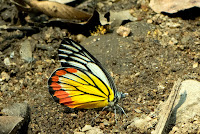 |
| Doi Suthep-Pui National Park, Chiang Mai, Thailand |
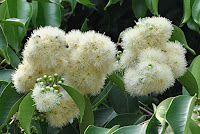 |
| Syzygium grande, a nectar source |
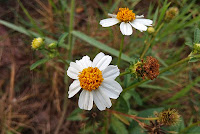 |
| Bidens pilosa, another nectar source |
Links to other pages in this series for species in the same family
Delias hyparete

